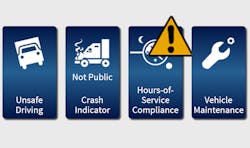Bill calls for safety ratings, not CSA, to be used in carrier hiring
Rep. John Duncan (R-TN) has reintroduced a bill to protect shippers and brokers from liability claims related to motor carrier selection, and at least one industry group has already announced its support.
The legislation, HR 1120, provides such a waiver from liability if the carrier is registered with and authorized to operate by the Federal Motor Carrier Safety Administration (FMCSA), has the minimum insurance coverage required by federal regulation, and does not have an unsatisfactory safety rating from FMCSA in force at the time of verification.
That eligibility is to be confirmed by the shipper or broker not more than 35 days before the shipment is picked up, ensuring that the latest available carrier records are used.
The legislation was introduced in the previous Congress, but languished in committee. Co-sponsors for the current bill are Reps. Rep. Rodney Davis, Richard Hanna, Mark Meadows, and Erik Paulsen—all Republicans.
The Transportation Intermediaries Assn. (TIA), which also backed the earlier bill, explains that the legislation would clarify and standardize industry best practices for hiring safe motor carriers. Currently, industry stakeholders “are often asked to second-guess” the FMCSA on determining which carriers are safe to operate and those that are not.
H.R. 1120 would remove “the confusing and conflicting vagaries” of the Compliance, Safety, Accountability (CSA) BASIC data as it relates to the negligent selection of a carrier, according to TIA. The group also says it will continue to advocate that the CSA initiative is “a valuable internal tool” for the Agency, but until the pending Safety Fitness Determination (SFD) rulemaking is complete, the BASIC data should not be used as a tool for carrier selection.
The FMCSA safety rating should be, and is, the ultimate determination, if a carrier is safe to operate or not, TIA contends.
“The current state of affairs of CSA and the ever-increasing threat of negligent selection lawsuits based on the BASIC data are hurting the transportation industry,” said TIA President and CEO Robert Voltmann. “In the marketplace today, every time a shipper, broker, forwarder, or receiver hires a carrier, they are essentially playing Russian roulette for their businesses’ livelihood. This national hiring standard reinforces the safety rating and licensing process already established by FMCSA, helps small business across America, and improves the overall safety of the transportation industry.”
About the Author
Kevin Jones 1
Editor
Kevin has served as editor-in-chief of Trailer/Body Builders magazine since 2017—just the third editor in the magazine’s 60 years. He is also editorial director for Endeavor Business Media’s Commercial Vehicle group, which includes FleetOwner, Bulk Transporter, Refrigerated Transporter, American Trucker, and Fleet Maintenance magazines and websites.

